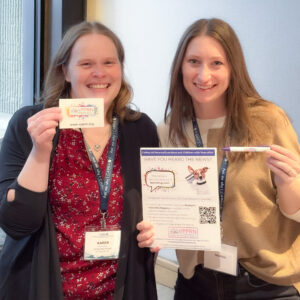A New Era for Pediatric Vasculitis Research
PedsVP PRN: Bridging Pediatric Vasculitis Research and Care
PRN: Bridging Pediatric Vasculitis Research and Care
Jessica Bloom, MD, MSCS, is a pediatric rheumatologist who has dedicated her career to advancing care for children with vasculitis. Her latest initiative, the Pediatric Registry of the Vasculitis Patient-Powered Research Network (PedsVPPRN), aims to bridge the gaps in knowledge and care for these young patients. In a recent interview, Dr. Bloom shared the motivations behind the project, the structure of the network, and the profound impact it could have on children with vasculitis.
Dr. Bloom completed a two-year Vasculitis Clinical Research Consortium (VCRC)-Vasculitis Foundation (VF) Fellowship, which provided her with a solid foundation in research methodology to help launch her academic career in vasculitis. Now, she is an Assistant Professor of Pediatrics at the University of Colorado School of Medicine and Attending Physician in Pediatric Rheumatology at Children’s Hospital Colorado in Aurora, Colorado.
A New Network for a Unique Population
The creation of the PedsVPPRN was driven by a dual motivation: first, to address the disconnect between how providers and families perceive the health of children with vasculitis, and second, to acknowledge the unique impacts the disease has on children, compared to adults. “While children with vasculitis may experience similar disease processes as adults, the impact on their daily lives and long-term development can be quite different. That’s something we haven’t fully addressed in research, and we need to,” Dr. Bloom explained.
The adult Vasculitis Patient-Powered Research Network (VPPRN), led by Peter A. Merkel, MD, MPH (University of Pennsylvania) and Jennifer Gordon, PhD (patient with eosinophilic granulomatosis with polyangiitis), has over 5,000 patients registered worldwide and has conducted dozens of research projects utilizing data contributed by patients with all forms of vasculitis. Drawing inspiration from its success, Dr. Bloom and her team saw a clear opportunity to create a similar resource for pediatric patients. “Families are eager to contribute, whether to help the next child with vasculitis, find purpose in their own journey, or simply feel heard during a challenging time,” she noted.
The PedsVPPRN is a branch of the VPPRN, the main research arm of the VF that was founded in collaboration with the VCRC. The VPPRN has received funding from the VF, the National Institutes of Health (NIH), the Patient-Centered Research Institute (PCORI), private foundations, and the biopharmaceutical industry, including specific funds for the VPPRN provided through a grant from Amgen. According to Dr. Merkel, “The creation of the PedsVPPRN fulfills a longstanding desire to better engage children with vasculitis in the VPPRN. Dr. Gordon and I are thrilled to see Dr. Bloom and Dr. Karen James, and their team, providing such strong and effective leadership for the creation of the PedsVPPRN.”
Building an Inclusive Global Network
The PedsVPPRN is an international, online platform where families and patients can participate in research by answering questionnaires about their experience with vasculitis. “This network is designed for anyone with a primary, chronic vasculitis, regardless of where they live. We want to gather insights directly from children and families—empowering them to shape the future of care and research,” Dr. Bloom said.
“We welcome anyone with a diagnosis of vasculitis to join the registry,” Dr. Bloom said. “Examples include, but are not limited to, ANCA-associated vasculitis (granulomatosis with polyangiitis, microscopic polyangiitis, eosinophilic granulomatosis with polyangiitis), Takayasu arteritis, polyarteritis nodosa, Behçet’s syndrome, central nervous system vasculitis, and IgA vasculitis (Henoch-Schönlein purpura).” Caregivers may enroll on behalf of their children of any age with vasculitis. Children 8 years or older may also enroll and answer some questions on their own. The amount of independence children have in answering questions will depend on their age group.
The platform allows participants to sign up through their mobile devices or computers, ensuring easy access around the world. Participants provide baseline information upon registration and complete follow-up questionnaires every six months. While the current forms are available only in English, the VPPRN team is committed to making the platform more accessible in the future.
 Collaborating with a Multidisciplinary Team
Collaborating with a Multidisciplinary Team
The network is the result of a close collaboration among a dedicated team of medical professionals, researchers, and patient advocates. “Our team includes pediatric rheumatologists, a health informatics specialist, and even parents and young adults who have lived with vasculitis,” Dr. Bloom said. “This collaborative approach ensures we’re asking the right questions and considering the perspectives of both the medical and patient communities.”
The team includes Karen James, MD, MSCE, a pediatric rheumatologist at the University of Utah; Amy Bolton, a parent of a child with vasculitis; Christine Yeung, VPPRN Project Manager; Jessica Nguyen, Network Research Coordinator; Cristina Burroughs, Health Informatics Regulatory Specialist, and Katrina Bargender, a young adult diagnosed with vasculitis in her teens.
Focusing on Patient-Centered Data
The PedsVPPRN gathers valuable data on various aspects of pediatric vasculitis, including health history, medications, quality of life, and the impact on school attendance. “We want to understand not just the medical aspects of vasculitis, but the physical, emotional, and social impacts on these children,” Dr. Bloom said. “We’re conducting focus groups with children and their caregivers to determine which aspects of their health-related quality of life they value most for inclusion in the questionnaires. This way, we can make sure the data we’re collecting reflects what matters most to them.” For example, the network aims to explore how children transition from pediatric care to adult care, as well as the challenges families face when accessing care. “We made sure the language we’re using is accessible for all ages, which is crucial when working with younger participants,” Dr. Bloom added.
Research Goals: Tackling Unanswered Questions
One of the most exciting aspects of the PedsVPPRN, according to Dr. Bloom, is the vast range of research questions it could help answer. “The potential research questions are endless,” she said enthusiastically. “We want to explore how vasculitis impacts children’s quality of life, what barriers they face in accessing care and attending school, how medications affect their health, and much more. We’re even inviting families to tell us what questions they want us to study.”
Dr. Bloom is also interested in examining the incidence, prevalence, and classification of pediatric vasculitis, areas where there is still much to learn. “There’s a lot of variation in how the disease presents in children, and we want to better understand those nuances to improve treatment and outcomes,” she explained.
The Role of the Network in Treatment and Outcomes
The PedsVPPRN is not designed to replace clinical trials, but rather to complement them. “By collecting data directly from patients and families, we can better understand the real-world impacts of different treatments and therapies,” she said. “We hope to provide insights that will help guide clinical decision-making, inform clinical study design, and improve patient outcomes.”
The longitudinal nature of the network, with data collected over time, is especially valuable. “We can track how the disease evolves and how different treatments affect patients over the years, giving us deeper insights into its progression,” Dr. Bloom noted.
Impact on Clinical Practice
Looking ahead, Dr. Bloom sees the PedsVPPRN as a tool that will influence the day-to-day practices of pediatric rheumatologists. “We hope the network will give clinicians better insights into how vasculitis affects children and what they can do to support families throughout the disease journey,” she said. “By involving families in the research process, we’re also empowering them to advocate for their children and get the support they need.”
Dr. Bloom and her team are committed to sharing the network’s findings with both providers and families as soon as they’re available, ensuring that the information is accessible and actionable for all involved.
Inspired by a Personal Commitment
Dr. Bloom’s dedication to this project is deeply personal. “I’ve always left conferences inspired by the scientific progress made in adult rheumatology,” she shared. “But when it comes to pediatrics, I’ve often felt that we’re lacking the resources and answers that families need. I want to change that by gathering data directly from the families and patients themselves. No one understands living with vasculitis more than they do.”
Ensuring Privacy and Security
Given the sensitive nature of the data, Dr. Bloom emphasized the robust measures in place to protect participants’ privacy. “We are fully compliant with Health Insurance Portability and Accountability Act (HIPAA) and General Data Protection Regulation (GDPR) guidelines, ensuring that personal data is stored securely and never shared without consent,” she stated. Additionally, participants can control the level of detail they wish to share, and all information is kept confidential to the extent permitted by law.
A Call to Action for Patients and Families
Ultimately, Dr. Bloom believes the PedsVPPRN can provide much-needed support and empowerment to families affected by vasculitis. “The diagnosis of vasculitis can be life-changing and isolating,” she acknowledged. “But through this network, we hope patients and families will feel like they have a voice. Their experiences matter, and by contributing to this research, they can help shape the future of treatment for children with vasculitis.”
To Dr. Bloom, this is more than just a research project—it’s an opportunity for families to make a difference. “This network offers families a chance to have a lasting impact on the future of vasculitis care,” she said. “And no matter where they live, they can be a part of something big.”
This sense of community and collaboration is at the heart of the PedsVPPRN, and Dr. Bloom hopes it will inspire both families and healthcare providers to work together for better outcomes in pediatric vasculitis care.
Families interested in joining the PedsVPPRN can sign up at vpprn.org or contact the support team at support@vpprn.org for more information.

